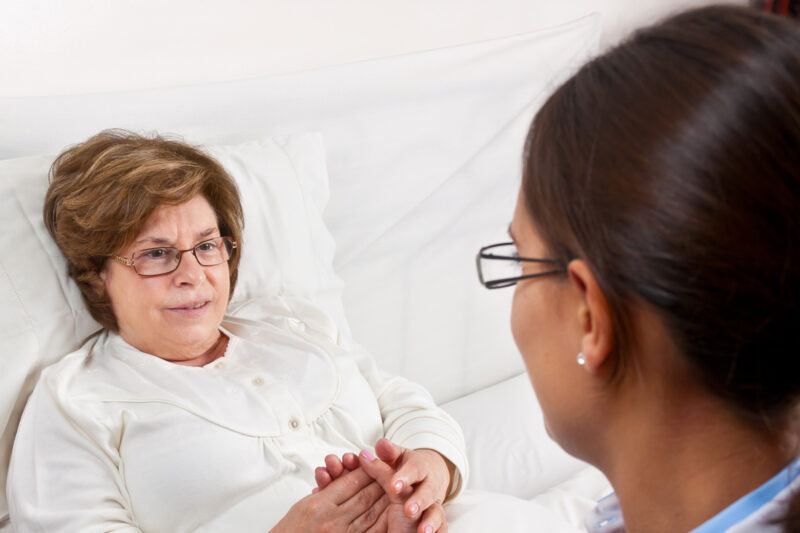As the saying goes – “Sleep is the best medicine”. And indeed it is. During the night sleep about 70% of the daily amount of a very important for the human body hormone melatonin is produced. This hormone of the pineal gland (epiphysis) regulates biorhythms, protects against stress, premature aging and even prolongs life. Sleep restores the body and the brain, during sleep our memory and blood pressure are regulated, immune functions are restored. Sleep disorders, especially in older people, significantly reduce their quality of life. Statistics show that 35% of seniors are experiencing problems with sleep deficiency. Thus in women (50%) the sleep disorders are met more often than in men (25%).
Some basic concepts of sleep
Sleep consists of two phases – rapid-eye-movement sleep (REM sleep) and non-rapid-eye-movement sleep (NREM sleep). During REM sleep, we process the obtained during the day information, “communicate” with our subconscious mind and see dreams. NREM sleep is divided into four phases. Falling asleep, people consistently pass all the phases of NREM sleep, then – REM sleep, then the cycle repeats.
Each cycle lasts about 90-100 minutes, and each duration of REM sleep increases, reaching in the morning up to 50 minutes. This is called sleep structure.
During the night, on average, five such cycles occur, and for the normal recovery of the body it is important for sleep not to be interrupted. However, with age, duration of sleep and its structure change.
Older people have the following sleep peculiarities:
• sleep in the elderly is discontinuous, fragmented;
• elderly often wake up at night and then have difficulty falling asleep, lying awake for about 30-60 minutes, and sometimes even more than an hour;
• elderly people go to bed earlier and falling asleep takes longer;
• sleep efficiency is reduced in the elderly (they are able to sleep only 80% of time spent in bed);
• senior’s sleep is more sensitive;
• biological clock shift with age: 50% of 70-year wake up before 7 a.m., and 25% – before 5.
All these are the normal age-related changes, and one should adjust to them. However, sometimes insomnia results from other causes, some of which are listed below:
– stress and psychological disorders;
– nutrition routine violation: late meals or overeating;
– drinking coffee or alcoholic beverages, as well as smoking;
– violation of the daily routine/sleep schedule;
– taking medications which may have insomnia as a side effect;
– periodic limb movement disorder, myoclonus or restless legs syndrome.
What can be done to prevent sleep disorders?
– Do not limit physical activity: a short walk before bedtime makes it easier to fall asleep.
– If you sleep poorly at night, do not go to bed in the afternoon. If you still feel tired during the day, it is better to sleep not more than two hours, and before 3 p.m.
– One of the most effective means in the fight against insomnia is a calm environment and fresh air. In such environment it is easier to fall asleep for any person, and especially for older people. You can sleep in the open air in the yard, in the garden, if there are conditions for this. It is good to sleep with an open window or window leaf: the flow of oxygen calms overexcited areas of the brain, and a person quickly falls asleep.
– For sleep to be normal, it is necessary to go to bed constantly at the same time. What is it for? If a person has a distinct schedule, timely rests and goes to bed always at the same hour, his entire body adapts to such a regime. At the time, when a person is used to get ready for bed, he already wants to sleep, he falls asleep quickly and soundly.
– Bright sunlight stimulates the activity of the organism, and the darkness, on the contrary, promotes sleep. In the elderly due to deterioration of vision (as a result of cataract, for example) the efficiency of the light exposure reduces, and thus the phase of wakefulness and sleep have less contrast. In this regard, experts advise to spend in the afternoon as much time as possible outside for the retina to receive enough light stimulation. In this case, darkness will promote sleepiness and quality sleep.
– Restrict fluid intake during the second half of the day, keeping its daily amount.
– Perform routine actions before bedtime. Make daily evening regimen (brush your teeth, wash, set the alarm clock) – this creates a good mood for sleep.
– Maintain a calm environment around yourself. The room where you sleep, should be dark, quiet, not hot and not cold.
– Bed – a place for sleep. And therefore do not use it for eating, reading, watching TV, and so on, that is, for those actions that are associated with an active lifestyle.
– Sleep is affected by many diseases: hypertension, gastric diseases, peptic ulcer disease, airways obstruction in case of problems with the lungs, chronic cerebrovascular insufficiency, renal and prostate diseases, accompanied by frequent urination, pain in the joints and spine. It is therefore important to control chronic diseases and keep them in a state of remission.
– Many medications taken by the elderly, affect the sleep structure. So sometimes you need to find an alternative drug.
With a wise attitude and care about their health every elderly person is quite able to establish a healthy, deep sleep.




